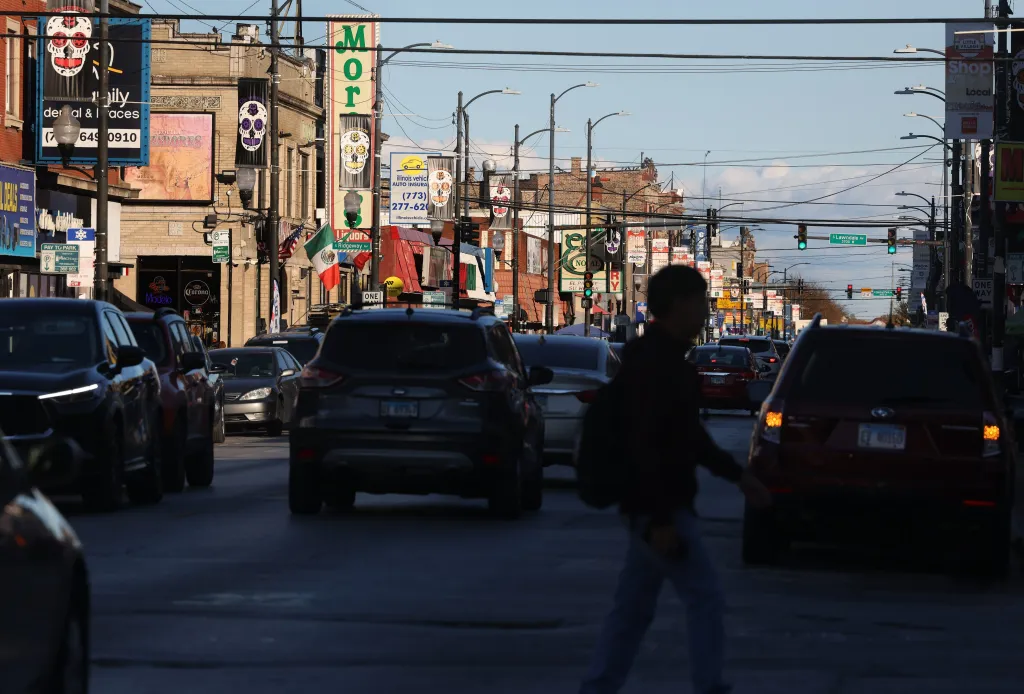Copyright Chicago Tribune

Take a walk through any of Chicago’s 15 majority-Latino communities today, and the empty storefronts will tell you everything you need to know about the state of the economy. While the murals are still bright and the smell of fresh bread still drifts from the panaderías, the rhythm of daily business has slowed. On streets once packed with families and workers, more windows are dark and more shopkeepers are wondering how long they can hold on. As natives of one such neighborhood, Little Village, we both know our city well and work alongside entrepreneurs, organizers and families who keep these neighborhoods alive. From immigration services and community development to policy research and local government, we also know how quickly federal decisions reverberate through our communities — and how too often, Latino business owners are left to shoulder the burden of ineffective federal policies. That burden’s current name is overzealous immigration enforcement. Indiscriminate raids and large-scale operations targeting street vendors, landscapers and parents — including U.S. citizens — are emptying corridors that were once full of life and draining revenue from the restaurants, shops and vendors that anchor our neighborhoods. The Chicago metro area is home to roughly 17,000 Latino-owned employer firms (those with at least one employee), and across the city, the fallout is visible block by block. In Little Village, longtime 26th Street retailers report their first sales declines in decades, while quinceañera boutiques say business is down by half as families cancel celebrations. In Belmont Cragin, restaurants have lost up to 80% of their revenue and shifted to mostly delivery to survive. In Pilsen, owners posted “Know Your Rights” signs and adjusted hours as staff fear being profiled or detained. And in Logan Square, ICE’s use of smoke grenades recently forced businesses to close their dining rooms to protect workers. Immigration enforcement is a political and moral issue, but it is also an economic one. Every raid, every arrest, every neighbor ripped from the community causes a wave of fear. This results in empty tables, smaller paychecks and darkened windows across Chicago’s Latino business districts. And those impacts will stretch far beyond Chicago’s Latino-majority corridors: lower sales tax collections, missed rent payments, job loss, frayed supply chains, canceled orders, and rising costs compounded by tariffs and federal program cutbacks will stall recovery and affect all Chicagoans. In response, Latinos Progresando convened community-based anchor organizations to launch a Corridor Resilience Fund that channels direct financial relief and additional resources to support local businesses. As illustrated in a new Brookings report, “Stabilizing Latino entrepreneurs amid federal policy volatility: What states, cities, and civic leaders can do now,” it is imperative to provide relief to these businesses. The report details how Latino entrepreneurs nationwide are being squeezed by overlapping federal shocks: unpredictable tariffs that raise costs, aggressive immigration enforcement that disrupts labor and consumer demand, and federal retrenchment (including layoffs at the Small Business Administration and the Community Development Financial Institutions Fund) that is hollowing out programs that keep affordable credit flowing to neighborhood entrepreneurs. Chicago has an opportunity to respond, and California shows what that can look like. When raids emptied Los Angeles business corridors, the county issued an emergency declaration and mobilized rent relief, legal aid and small business grants within days. The county also launched a fund alongside the California Community Foundation to stabilize vendors and local businesses. Together, they reframed enforcement fallout as an economic emergency rather than just a social one. Chicago can do the same. The city has models and frameworks it can build on, from the Chicago Empowerment Fund to the 2020 Chicago Resiliency Fund to community models such as Chicago Street Vendor Fund, which offers fast microgrants to vendors recovering from equipment losses or enforcement sweeps. These initiatives show that the city and its partners can coordinate financial relief to those most in need. City leaders can formalize and scale this infrastructure into a rapid-response fund that provides much needed relief to the local economic engines now under siege. Working together, the city of Chicago and state of Illinois can go even further than California. They can build a permanent system of resilience that helps small firms weather federal shocks, whether they stem from tariffs, immigration enforcement, or retrenchment. Such a system can aim to: Get dollars out the door fast. Pool flexible capital among the state treasurer, community foundations, and local banks to keep credit moving and deliver emergency funds quickly when federal programs stall. Stabilize local corridors. Invest in a Corridor Resilience Fund to immediately help affected businesses stay open, maintain payrolls and preserve neighborhood anchors. Buy and build local. Expand procurement programs to ensure public contracts intentionally prioritize small and minority-owned firms — circulating wealth within Illinois communities. Engage the private and philanthropic sectors. Companies and nonprofits can expand contracting opportunities for Latino entrepreneurs, and funders can make coordinated, transparent commitments that channel capital toward these firms. Members of Congress also have a role to play, even without new legislation. They can use their oversight and convening power to ensure small business programs remain flexible and responsive during crises, and champion better data on how enforcement and trade policies affect local economies. Through hearings, district visits, and public statements, they can help shift the national conversation — from one focused on enforcement to one that recognizes Latino businesses as American businesses that fuel jobs, innovation and economic growth across the country. The question isn’t whether federal shocks will strike again. They will. Instead, the question is whether we have built the systems to absorb them. Latino entrepreneurs have kept our neighborhoods alive through every crisis, from the pandemic to policy whiplash to the enforcement crackdowns unfolding today. They’ve done it with grit, creativity and faith in their communities. City, state, business and community leaders have an opportunity to match their resilience by strengthening the systems that support these businesses. Tonantzin Carmona is a fellow at the Brookings Institution, Metro Program, and former director of the Chicago Mayor’s Office of New Americans. Luis Gutiérrez is the founder and CEO of Latinos Progresando, a Chicago-based nonprofit organization with the mission to elevate the well-being of the Mexican community.



